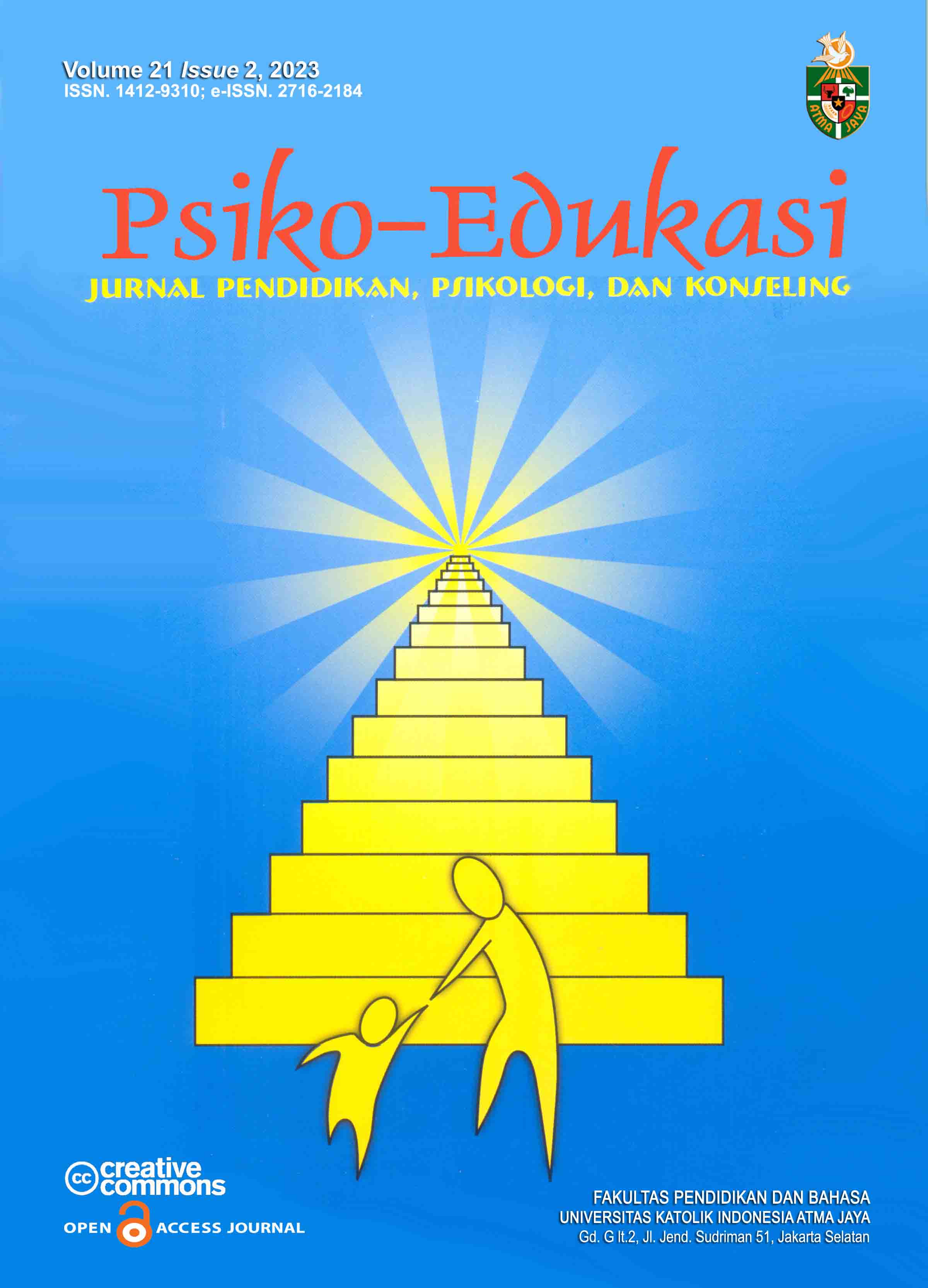ANALISIS KORELASI ANTARA REGULASI EMOSI DAN PERILAKU MEMAAFKAN REMAJA PANTI ASUHAN
CORRELATION ANALYSIS BETWEEN EMOTION REGULATION AND FORGIVENESS BEHAVIOR OF ORPHANAGE ADOLESCENTS
DOI:
https://doi.org/10.25170/psikoedukasi.v21i2.4879Keywords:
Emotion regulation, managing emotions, forgiveness, new relationshipsAbstract
Emotion regulation is an individual's ability to manage emotions which includes the ability to control oneself, have good interpersonal relationships, have tolerance for frustration, have a positive view of oneself and others, have the ability to adapt, and have a careful attitude. Forgiveness behavior is an individual's effort to overcome the negative impact and judgment towards the perpetrator by demonstrating a new relationship with the person who has hurt which includes emotional dimensions, cognitive dimensions and interpersonal dimensions. This research aims to determine the level of emotional regulation, the level of forgiveness behavior, and the relationship between the two variables. Research data collection was carried out using an assessment scale instrument developed by the researchers. Based on the results of instrument testing, it was found that the emotional regulation instrument had 70 statements, all of which were valid with a reliability of 0.975. Likewise, the forgiveness behavior instrument has 70 statements, all of which are valid with a reliability of 0.976. The research results show that there is a positive and significant relationship between emotional regulation and forgiveness behavior with a correlation coefficient of 0.817. Emotion regulation contributes 67% to forgiveness behavior.
References
Astuti D, Wasidi, & Shintia R. (2019). Hubungan Antara Regulasi Emosi Dengan Perilaku Memaafkan Pada Siswa Sekolah Menengah Pertama. Jurnal Consilia. 2(1). 1-1. Diunduh dari https://ejournal.unib.ac.id/index.php/j_consilia.
Astuti, W., & Marettih, A. K. E. (2018). Apakah Pemaafan Berkorelasi dengan Psychological Well-Being pada Remaja yang Tinggal di Panti Asuhan?. Jurnal Ilmu Perilaku. 2(1), 41-53. Diunduh dari https://doi.org/10.25077/jip.2.1.41-53.2018.
Essau, C., Leblanc S., & Ollendick T. H. (2017). Emotion Regulation and Psychopathology in Children and Adolescents. Oxford, UK: Oxford University Press.
Farozin, M. (2016). Pedoman Operasional Penyelenggaraan Bimbingan dan Konseling Sekolah Menengah Pertama. Kementrian Pendidikan dan Kebudayaan Direktorat Jenderal Guru dan Tenaga Kependidikan.
Goleman, D., Boyatzis, R., & McKee, A. (2004). Primal Leadership: Learning To Lead With Emotional Intelliegence. UK: Harvard Business School Press.
Gross, J. J. (2007). Handbook Of Emotion Regulation. New York: The Guilford Press.
Irwansyah, L. (2016). Kemiskinan, Keluarga dan Prostitusi pada Remaja. Psychology and Humanity. 19(20), 213-218. Diunduh dari http://mpsi.umm.ac.id/files/file/213-%20218%20lutfi%20irwansyah.pdf.
Jahja, R. (2015). Psikologi Perkembangan. Jakarta: Kendana.
Kusnia, R., & Rahmanawati, E. I. (2015). Gambaran Forgiveness pada Orang Bercerai di Kecamatan Kunir Kabupaten Lumajang. Insight: Jurnal Pemikiran dan Penelitian Psikologi, 11(2).
Manz, C. (2007). Emotional Discipline 5 Langkah Menata Emosi Untuk Merasa Lebih Baik. Jakarta: Pustaka Gramedia Utama.
McCullough, M. E. (2001). Forgiveness: How Does It And How They Do It? . Current Directions in Psychological Science. 6(10), 194-197. http://cdp.sagepub.com/.
Nashori, F. (2011). Meningkatkan kualitas hidup dengan pemaafan. Jurnal Unisia. 7(5), 214-226. Diunduh dari https://journal.uii.ac.id/index.php/Unisia/article/download/5584/5008.
Pedhu, Y. (2022). Forgiveness therapy sebagai salah satu intervensi terapeutik dalam konseling. Jurnal Bimbingan Konseling Indonesia (JBKI). 7 (2), 99-106
Prastiti, W. D. (2013). Peran orangtua dalam perkembangan kemampuan regulasi emosi anak: Model teoritis. Dalam prosiding seminar Nasional: Parenting (Optimalisasi Peran Orangtua dalam Pendidikan Karakter Bangsa). Fakultas Psikologi, Universitas Muhammadiyah Surakarta. Diunduh dari https://publikasiilmiah.ums.ac.id/bitstream/handle/11617/3966/A30.pdf;sequence=1.
Pratisti, W. D., & Prihartanti, N. (2012). Konsep mawas diri Suryomentaram dengan regulasi emosi. Jurnal Penelitian Humaniora, 13(1), 16-29. Diunduh dari http://journals.ums.ac.id/index.php/humaniora/article/viewFile/911/626.
Pusat Data dan Informasi Kementrian Kesehatan Republik Indonesia. (2020). Situasi Kesehatan Reproduksi Remaja. Diunduh dari https://pusdatin.kemkes.go.id/resources/download/pusdatin/infodatin/infodatin-reproduksi-remaja.pdf.
Santrock, J. W. (2002). Adolescence Perkembangan Remaja. Jakarta: Erlangga.
Snyder, C. R., & Lopez, S. J. (2002). The future of positive psychology :Handbook of positive psychology. New York: Oxford University Press
Umar, N. M. (2012). Regulasi Emosi Pada Remaja Panti Asuhan Muhajirin Balikpapan Timur (Doctoral dissertation, University of Muhammadiyah Malang).
Worthington, E. L. (2005). Handbook Of Forgiveness. New York: Routledge
Worthington, E. L. (2006). Forgiveness and Reconciliation. New York: Routledge.
Yusuf, S. (2011). Perkembangan Peserta Didik. Jakarta: Raja Grafindo Persada.
Downloads
Published
Versions
- 2023-12-01 (3)
- 2023-12-01 (2)
- 2023-10-31 (1)


















